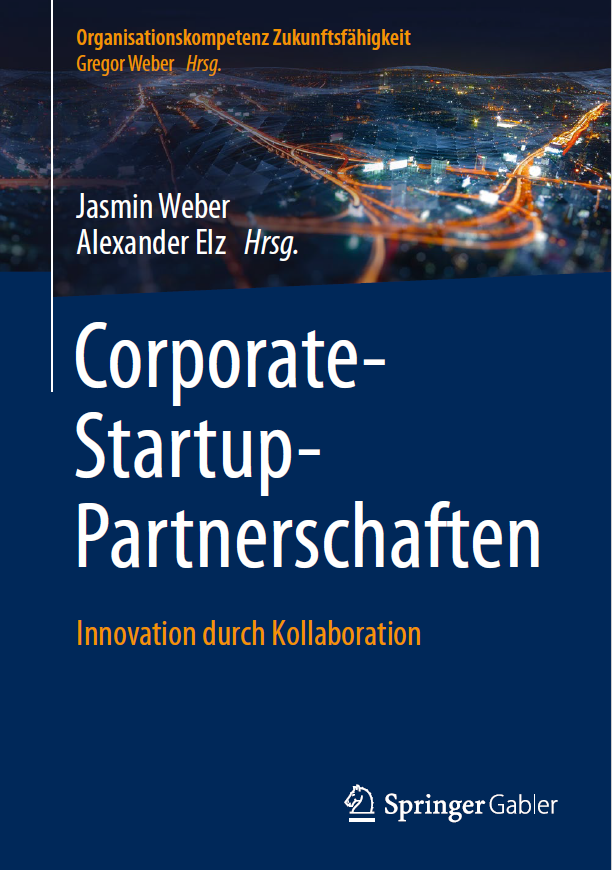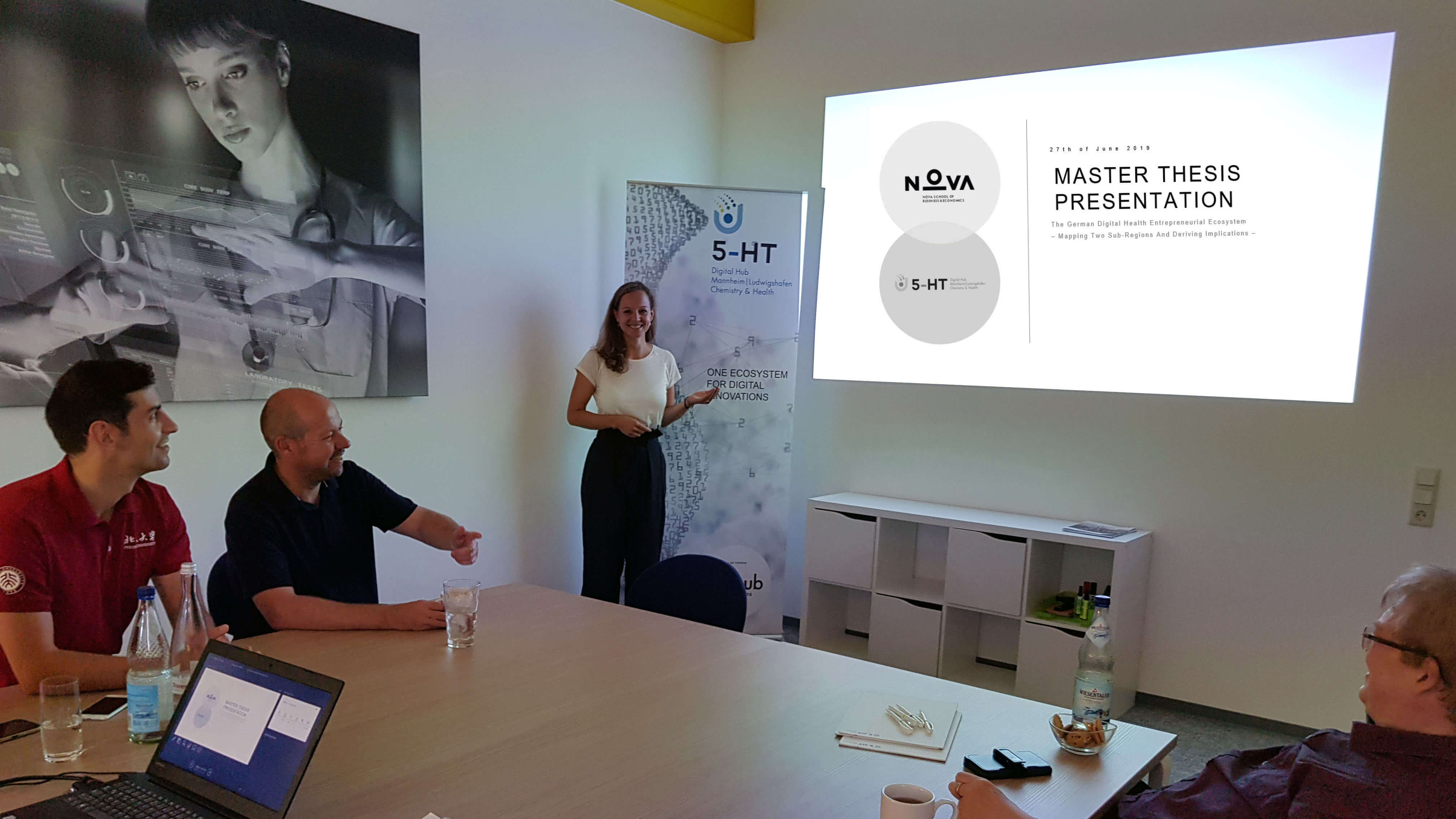What can corporates learn from startups about digital innovation in the pharmaceutical industry?
Amelie Nigbur
Author: Amelie Nigbur, 5-HT Digital Innovation Ecosystem Manager
Introduction
5-HT Digital Innovation Ecosystem Manager Amelie Nigbur has successfully finished her Master´s degree at University of Worms in Entrepreneurship. In her thesis she dealt with the following question: Corporate innovation and startups: What can large corporations learn from startups in the context of digital innovation in the pharmaceutical industry and what guidance can be derived from it?
The thesis explores the impact of digitalization on the pharmaceutical industry and highlights the challenges and opportunities it presents. Key findings reveal that while digital transformation offers significant potential benefits, the industry faces hurdles in adapting due to organizational structures, slow decision-making processes, and a lack of customer-centric approaches. Drawing insights from startup methodologies, the paper suggests strategies for overcoming these challenges, including the implementation of cross-functional teams, promoting individual deep focus time, agile training and retrospectives, establishing dedicated customer groups for testing digital products, and fostering action-oriented behavior to cultivate a more transparent error culture. These approaches aim to inspire adaptation of startup methods within large pharmaceutical companies to drive digital innovation effectively.

Status Quo - Digitaliziation in the Pharmaceutical Industry
In recent years, digitization has transformed various industries, with technologies like Artificial Intelligence (AI) and innovations such as ChatGPT reshaping daily life. The healthcare sector, driven by the COVID-19 pandemic, has seen significant advancements through digital transformation and the integration of AI and 'eHealth' solutions (Handelsblatt, 2023; Mumm et al., 2020). According to a study by Roland Berger (2019), the market volume for digital products and services in the healthcare sector will be around 155 billion euros across the European Union in 2025, impacting all healthcare players, including the pharmaceutical industry.
The focus of the pharmaceutical industry has traditionally been on the development, production and supply of drugs. However, the rapidly advancing digitalization of recent years is also prompting more and more pharmaceutical companies to fundamentally rethink their approach. Gradually, the trend towards a patient centric approach is taking hold. Digital health solutions can not only improve the patient experience through better access to information, but also fundamentally change the pharmaceutical industry thanks to real-time documentation and the possibility to understand customer deci-sion making processes (Petrovic, 2023).
However, despite the potential benefits, the pharmaceutical industry lags in digitization compared to other sectors. Digital disruption poses challenges, both externally and internally, including the lack of digital expertise and the resistance to change among employees (Bundesministerium für Wirtschaft und Klimaschutz 2018; CHEManager, 2017). Also, the industry struggles with understanding customer decision journeys and faces a significant gap in digital maturity compared to other sectors (McKinsey Global Institute, 2023).
The resulting increase in complexity as well as the resulting uncertainty of digitization requires businesses to respond quickly to change (Bennett & Lemoine, 2022). Startups have developed a way of dealing with this uncertainty by using methods that allow fast adaption to changing conditions while keeping customer centricity (Glatzel & Lieckweg, 2016; Bogott et al., 2017).
Therefore, the research aims to empirically examine the greatest challenges of digital innovation for pharmaceutical companies and what large corporations can learn from startups in the context of digital innovation in the pharmaceutical industry.
Research Procedure
The research question required information about the working methods and innovation approaches of digital health startups gathered through expert interviews in order to then discuss these findings with experts from the pharmaceutical industry, according to their challenges and their subjective attitudes and views on learnings for the pharmaceutical industry. 4 expert interviews with startup founders and 4 expert interview with innovation managers, digitalization managers etc. from pharmaceutical companies revealed insightful results.
Key Findings
The findings from the pharma interviews show that the perceived challenges and barriers in terms of digital innovation relate to the major structural characteristics of a large corporation and especially occur in the organizational structures and in the way of working and thinking due to traditional pharmaceutical innovation approaches. The pharma experts were able to derive learnings for these challenges even though some startup approaches are already being used in some of their teams and departments. However, these new ways of working have not yet fully arrived in the companies.
Decision-making processes
Corporate Challenge: Slow decision-making processes and complex responsibilities due to strong involvement of many internal stakeholders and strong opinions of superiors.
Learnings from Startup approaches: Person who is expert and has most insights of respective topic should make the decisions rather than the highest ranked employee.
Communication and project progress
Corporate Challenge: Slow communication and slow project progress due to lack of focus and priority for digital innovations on corporate and individual level and high number of partial unproductive meetings.
Learnings from Startup approaches: Setting up cross-functional teams to carry out a project with focus with lots of freedom and own responsibility, conducting high-level and deep-dive meetings to sort out unnecessary meetings, making more space for creativity, ideation and deep focus, setting up agile meeting culture (e.g. daily standups) would help to align everyone on a common goal.
Organizational structures
Corporate Challenge: Lack of linking digital innovation to the broader business due to little to no exchange between other business areas.
Learnings from Startup approaches: Setting up cross-functional teams to share ideas and decisions beyond own department or business area.
Customer centricity
Corporate Challenge: Difficulties following customer centric approaches due to partial internal motivations for innovation and restrictions to incorporate customer feedback. Sometimes customer-focused development is partially given, however, usually only possible within special teams, departments or selected projects.
Learnings from Startup approaches: Using real customer problem as a source for inspiration of innovation and validating assumptions regularly with the user, involving customers into idea selection through customer votings, implementing WhatsApp groups and sounding boards with customers to connect with customers in a practical way, approaching customers directly to get real insights rather than second-hand data.
Agility
Corporate Challenge: There are difficulties in implementing agile and flexible working methods due to the traditional way of thinking and working of employees in the pharmaceutical environment. Sometimes agile working is partially implemented, however, usually only possible within special teams, departments, or selected projects.
Learnings from Startup approaches: Implementation of retrospectives would encourage critical thinking and help to implement continuous feedback and improvement culture. Also, actively asking employees for their opinions would help to encourage independent, critical and creative thinking.
Error Culture
Corporate Challenge: Fear of making mistakes due to strong regulation and compliance conditions of the pharmaceutical environment.
Learnings from Startup approaches: Application of action-oriented thinking by sharing learnings of mistakes.
(Beyond the above findings the research also revealed other challenges of pharmaceutical companies in terms of digital innovation. Due to fixed and established standard technology used within pharma companies there is a lack of flexibility to use technologies that would be more suitable for certain needs. In Addition, progress through digital innovation is sometimes hindered by the fear of losing jobs or business models due to new digital solutions. Another structural challenge in large corporations is the lack of trust by superiors that is needed to execute digital innovation projects. This is due to the fact that superiors change regularly and take on different positions, meaning that the innova-tion teams have to constantly rebuild trust with new superiors.)
Adapting Startup approaches: Strategies for overcoming Digital Innovation challenges in the Pharmaceutical industry
The results of this research project show that, in addition to the challenges associated with digital innovations in pharmaceutical companies, there is also potential for improvement. Of course, it is not possible to implement startup approaches and methodologies one-to-one in a large pharmaceutical company. But the approaches offer inspiration to implement such methods in adapted forms also in large companies.
-800.jpg)
Cross-functional teams: Digital innovation is sometimes not considered in the overall context of a large organization and a cross functional view and approach is needed to implement digi-tal innovations and projects beyond the boundaries of one business area. Pharmaceutical companies could support this by setting up cross functional and cross divisional teams that work together on digital innovation. To integrate different perspectives and ideas (e.g. from different treatment areas such as oncology, diabetes etc.) into the development in a first step and to implement these developments in the respective business area in a second step.
Company-wide measure for individual deep focus time: It also becomes clear that the prevailing meeting culture, which is characterized by a high number of meetings, leaves little time and free space for creative thinking and focused work, which, however, is needed for innovation in general and digital innovation in particular. It was also shown that most employees are aware of this problem, but no one can break the vicious circle of meeting overload in a large corporation. Concepts are therefore needed that provide a uniform guideline for all employees. Pharmaceutical companies could support the creation of free time by introducing a company-wide measure that, for example, grants meeting-free time. This would not only encourage digital innovation, but also supports innovation and new ways of thinking in general and allows deep focus work among employees.
Agile training and retrospectives: Traditional ways of working and thinking prevail in the respective companies and new and agile ways of working are not always known or understood. One way to introduce employees to new ways of working is through training on these methods. But conducting regular retrospectives in digital teams can also help to critically question project progress, given assumptions and ways of working and provide a space where employees are actively asked for their opinions and perspectives.
Dedicated customer groups for testing digital products: For the development of digital products, customers' needs are already considered, however, the implementation to gain real insights through customer interaction is only partially possible due to the strict internal regulations within the pharmaceutical companies. However, customer insights are needed to develop valuable digital solutions that meet customer needs. But it is also clear that pharmaceutical companies need regulations when it comes to external communication due to their size. To remedy this, however, a specially selected customer base could be assembled for a digital project, which would be directly available to the team for the duration of the project, without having to seek repeated approval from other departments (e.g. sales). Rapid feedback methods such as WhatsApp groups or sounding boards could then be used in this selected group.
Action oriented behavior: Not all pharmaceutical companies practice an open error culture due to the highly-regulated environment of the pharmaceutical industry. However, in order to develop digital solutions, the agile way of working promotes early failure and thus counteracts the risk of developing something that has no value for the customer. In order to develop a more transparent error culture, managers could promote action-oriented behavior in the event of errors by not pointing fingers at someone, but rather actively finding solutions and subsequently discussing mistakes with other team members in order to derive learnings from it.
Sources
Bennett, N., & Lemoine, J. (2022, August 31). What VUCA really means for you. Harvard Business Review. Retrieved May 22, 2023, from https://hbr.org/2014/01/what-vuca-really-means-for-you
Bogott, N., Rippler, S., & Woischwill, B. (2017). Im Startup die Welt gestalten. Springer Gabler Wiesbaden. https://doi.org/10.1007/978-3-658-14505-7
Bundesministerium für Wirtschaft und Klimaschutz. (2018). Monitoring-Report Wirtschaft DIGITAL 2018. In Bundesministe-rium Für Wirtschaft Und Klimaschutz. Retrieved August 7, 2023, from https://www.bmwk.de/Redaktion/DE/Downloads/C-D/digitalisierungsprofil-chemie-pharma-2018.pdf?__blob=publicationFile&v=2
CHEManager (Ed.). (2017). Digitalisierung in der Pharmaindustrie. CHEManager. Retrieved April 24, 2023, from https://www.chemanager-online.com/news/digitalisierung-derpharmaindustrie
Glatzel, K., & Lieckweg, T. (2016). Führen unter Unsicherheit – Was man von Start-ups lernen kann. In O. Geramanis & K. Hermann (Eds.), Führen in ungewissen Zeiten. Springer Gabler Wiesbaden. https://doi.org/10.1007/978-3-658-11227-1_25
Handelsblatt. (2023, June 27). Themenwoche: Warum wir diese Woche so viele Texte zu KI veröffentlichen. Handelsblatt. Retrieved August 9, 2023, from https://www.handelsblatt.com/technik/forschung-innovation/handelsblatt-ki-woche-warum-wir-so-vieleartikel-ueber-kuenstliche-intelligenz-veroeffentlichen/29227266.html
McKinsey Global Institute. (2023). Top ten observations from 2022 in life sciences digital and analytics. McKinsey & Compa-ny. Retrieved May 30, 2023, from https://www.mckinsey.com/industries/life-sciences/our-insights/top-ten-observations-from-2022-in-lifesciences-digital-and-analytics
Mumm, J., Rodler, S., Mumm, M., Bauer, R. M., & Stief, C. G. (2020). Digitale Innovation in der Medizin – die COVID-19-Pandemie als Akzelerator von „digital health“. Journal Für Urologie Und Urogynäkologie/Österreich, 28(1), 1–5. https://doi.org/10.1007/s41972-020-00126-2
Petrovic, T. (2023, March 3). Verbesserte Ergebnisse: Warum KI-basierte Gesundheitslösungen für die Pharmaindustrie unverzichtbar sind. Handelsblatt. Retrieved August 13, 20223, from https://live.handelsblatt.com/verbesserte-ergebnisse-warum-ki-basiertegesundheitsloesungen-fuer-die-pharmaindustrie-unverzichtbar-sind/
Roland Berger. (2019). Digitalisierung im Gesundheitswesen: Handeln statt sondieren. Retrieved August 11, 2023, from https://www.rolandberger.com/de/Insights/Publications/Digitalisierung-im-Gesundheitswesen-Handeln-statt-sondieren.htm
Related posts
You may be interested in these articles:
5-HT Chemistry & Health Newsletter
Want the latest tech and industry news, events, relevant info from the ecosystem and more?
Subscribe to 5-HT Newsletter now Subscribe to 5-HT Newsletter now
Become part of the 5-HT Chemistry & Health
Exchange ideas with innovative startups and future-oriented companies in our ecosystem. We look forward to meeting you!


